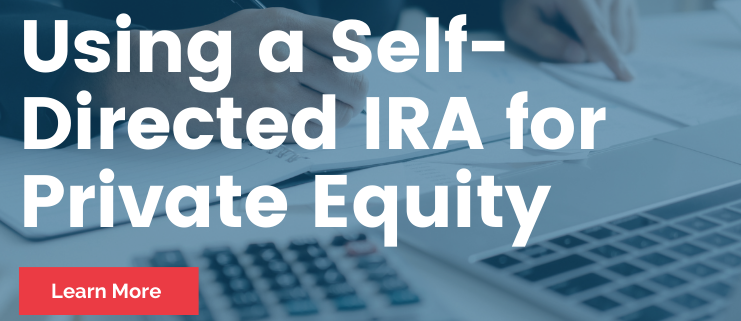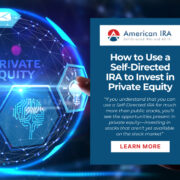Using a Self-Directed IRA for Private Equity
Private stocks. For many investors, they’re the ultimate form of investing—a way to buy low and sell spectacularly high. After all, if you get in on the “ground floor” of a private stock not yet listed on the public stock exchanges, it can represent a life-changing amount of wealth. But what not many investors know? You can hold private stocks within a Self-Directed IRA. Let’s look at what you’ll need to know about using Self-Directed IRAs for private equity:
Why Use a Self-Directed IRA for Private Stocks?
One of the primary advantages of using a Self-Directed IRA for private equity? We mentioned it above. There’s simply more potential for higher returns. Private equity investments often yield substantial profits if the company grows successfully or is acquired. However, it is essential to conduct thorough due diligence before committing your retirement funds. Evaluating the business model, financial health, market potential, and management team are critical steps in the due diligence process. The goal is to mitigate risks by selecting promising investment opportunities that align with your risk tolerance and investment objectives.
Doing Your Homework Before Buying a Stock
Due diligence is a fundamental part of private equity investing. What does it mean? Think of it as a comprehensive evaluation of the investment opportunity. When considering a private equity investment within a Self-Directed IRA, doing your homework ensures that the investment complies with IRS rules and is likely to be profitable.
True: every asset has risks. But you maximize your chances of success when you do your homework. This process typically includes reviewing the company’s financial statements, understanding its competition, and understanding its market.
For example, investing in a startup might offer the potential for high returns, true. But it also comes with significant risk. Startups often face uncertainties and volatility. That leads to a high failure rate. On the other hand, investing in an established private company might offer more stability but could yield lower returns. By doing your homework, you can make informed decisions that balance risk and reward.
Understanding IRS Regulations
Sifting through the IRS regulations is another critical component of using a Self-Directed IRA for private equity. The IRS has specific rules regarding the types of investments allowed and prohibited transactions. One key rule? Investments made with a Self-Directed IRA must be for the exclusive benefit of the IRA. This means you can’t use your IRA funds to invest in a business where you or certain family members have a personal interest.
To avoid prohibited transactions, work closely with your custodian (like American IRA) and seek advice from financial or legal advisors familiar with Self-Directed IRAs. Maintaining compliance with IRS rules is critical. It protects your IRA’s tax-advantaged status and prevents penalties that could eat away at your retirement savings.
Why invest in private stocks? Private equity investments can be game-changing additions to your retirement portfolio. The potential for growth is enormous. However, simply adding them to your portfolio isn’t enough. You have to find the right opportunities. This requires a proactive approach to manage and monitor your investments effectively. Regularly review your portfolio. Stay informed about changes in IRS regulations. You’ll maintain compliance and stand a far better chance at achieving long-term success.
If you’re interested in exploring private equity investments through a Self-Directed IRA, consider reaching out to a knowledgeable custodian like American IRA. Our expertise can guide you through the process, ensuring that your investments are compliant and in good standing. Interested in learning more about Self-Directed IRAs? Contact American IRA, LLC at 866-7500-IRA (472) for a free consultation. Download our free guides or visit us online at www.AmericanIRA.com.






